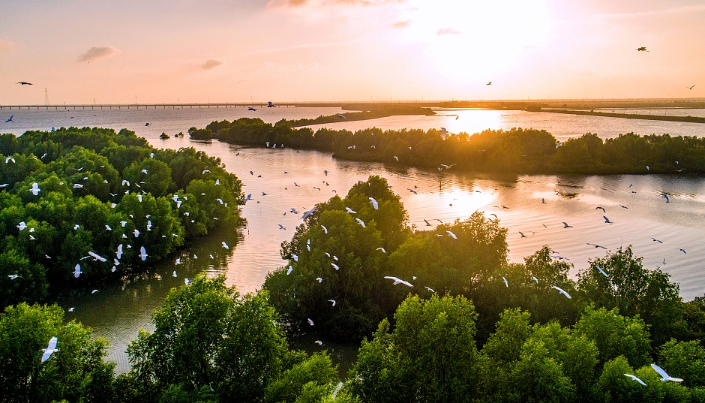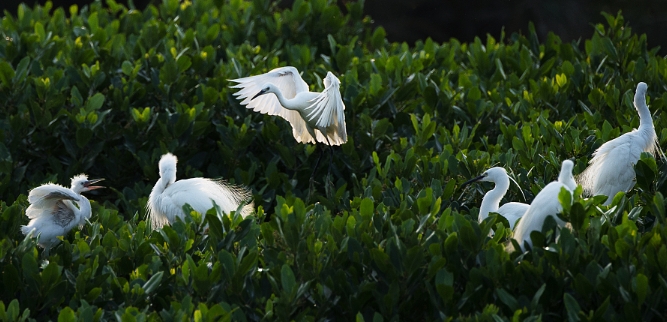
Following the visit of Chinese President Xi Jinping, officials in Zhanjiang, a coastal city in western Guangdong Province, have made a commitment to protect and preserve their mangrove forests. Their goal is to transform Zhanjiang into a “city of mangroves” and promote sustainable and eco-friendly development in the region.
The Zhanjiang Mangrove National Nature Reserve holds the distinction of being the largest individual mangrove forest in China. This remarkable ecosystem not only serves as a haven for numerous species of migratory birds throughout the year but also thrives as a vibrant habitat for fish, shrimp, crab, and various types of shellfish.
According to Zhang Wei, deputy director of Guangdong Zhanjiang Mangrove National Nature Reserve Administration, significant progress has been made in the past two decades in expanding the mangrove forests in Zhanjiang. Approximately 1,500 hectares of mangrove trees have been planted, creating a more extensive habitat for diverse species. The results of a bird survey conducted in 2002 indicated the presence of only 194 bird species in the area. However, in the latest bird survey, it was reported that Zhanjiang now boasts 312 bird species. The improved ecological environment, particularly in the mangrove forests, has attracted a greater variety of wildlife to settle in Zhanjiang.
In recent times, Zhanjiang has intensified its endeavors to establish itself as “a city of mangroves.” The city has prioritized the conservation and rejuvenation of the mangrove ecosystem, while also fostering the seamless integration of mangrove ecological preservation with coastal tourism, tourism agriculture, recreational fishery, and other business ventures. Through these concerted efforts, Zhanjiang aims to create robust and sustainable “green engines” for its development, ensuring a high-quality and environmentally conscious trajectory.

Guan Hui, director of Zhanjiang’s Ecology and Environment Bureau, expressed a strong sense of responsibility as an ecological and environmental protection specialist. Recognizing the significance of mangroves, the city is actively exploring systems and mechanisms to unlock the ecological value of these ecosystems. This includes harnessing the carbon sink capacity of mangroves and developing sustainable economic activities within the mangrove forests. The aim is to provide enriching eco-tourism experiences for both residents and visitors. Guan Hui envisions a harmonious coexistence between humans and nature, where tourists can immerse themselves in the captivating scenery of mangrove forests with migratory birds gracefully soaring above.
According to Zhang, the transformation of the ecological environment has inspired a growing number of residents to actively participate in the endeavor of creating “a city of mangroves.” As the city progresses in its mission, more and more individuals willingly engage in the protection and preservation of the mangrove forests. In recent years, an increasing number of people have been able to freely explore the mangrove forests, relishing in the invigorating fresh air. Zhang believes that as the mangroves receive enhanced protection, leading to a healthier ecological environment and more captivating landscapes, people will experience an amplified sense of happiness and contentment.
Mangrove forests predominantly thrive in tropical and subtropical intertidal zones, making them an integral component of the marine ecosystem. They hold significant value, comparable to that of coral reefs, salt marshes, and seagrass beds. Mangrove forests play crucial roles in multiple facets of marine ecosystem conservation, including the purification of seawater, mitigation of natural disasters by absorbing winds and waves, sequestration and storage of carbon, and the preservation of biodiversity. These attributes have earned them recognition as the guardians of the coast and the lungs of the ocean.
Chen Zheng, the chief of the CPC branch in Mazhang District, expressed the commitment to take tangible actions in safeguarding the invaluable natural treasure, the mangroves.
“Our focus will be on enhancing public awareness regarding the protection of mangroves and responsible utilization of the sea. We will actively promote the restoration and reforestation of mangroves, ensuring the preservation of this precious gift from nature,” emphasized Chen.

